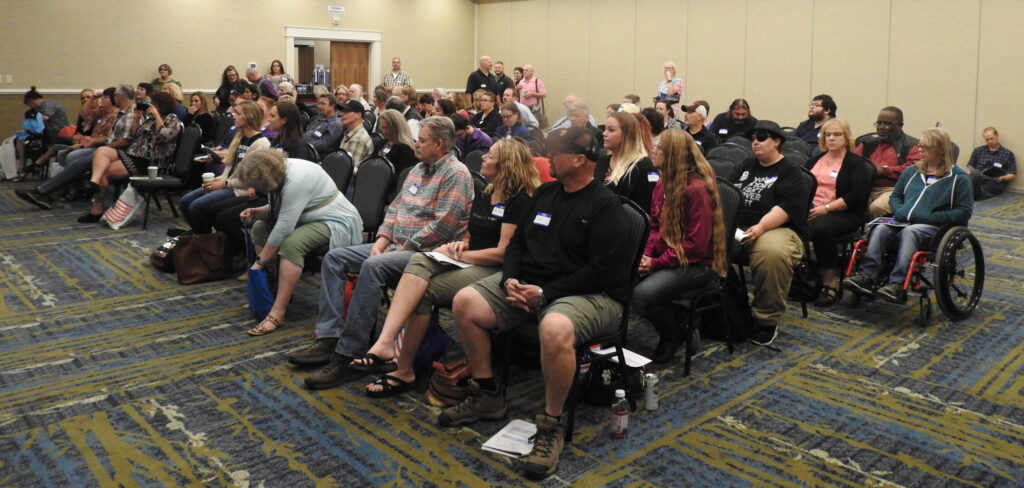We are a network of individuals who are on the path of recovery.
We identify as being in recovery from mental health, substance abuse and or addiction struggles. Together we share information, provide peer support, advocate with a united voice and improve the system. We come from places all across Montana, with different stories and experiences but together we make a difference. This is the Recovery Movement in Montana.


Advocacy
 Standing up for what we believe is right, having a voice, making choices in recovery, and sharing our own recovery story are some of the things that make up advocacy and self-advocacy.
Standing up for what we believe is right, having a voice, making choices in recovery, and sharing our own recovery story are some of the things that make up advocacy and self-advocacy.
Let’s start with self-advocacy which refers to an individual’s ability to effectively communicate, convey, negotiate, or assert his/her own interests, desires, needs, or rights. It involves making informed decisions and taking responsibility for those decisions (Van Reusen et al., 1994).
Knowing yourself and your strengths, needs, and interests is the first step toward advocating for your rights. Once we begin to find our way on the path of recovery, we may want to begin to advocate for ourselves with those around us—peer supporters, friends, family, service providers, and doctors. These conversations may be difficult, but having them is vital to your recovery. Remember, you are the expert on yourself.
It may be that prior to getting on the path to recovery, others were making decisions for you or acting in what they believed to be your best interest. Now may be the time for you to let others know what you believe to be in your best interest. You may find yourself in the process of taking control and making decisions affecting your life and perhaps others’ lives. This process of self-determination means making informed choices, problem solving, setting and attaining goals—essentially being a self-advocate.
Advocacy or advocating for others may be something you are interested in doing. Advocating for another person isn’t about acting in a person’s perceived best interest, but it is standing with a person to ensure they are able to articulate and obtain what they want or need. Perhaps you may consider speaking up and advocating for various changes in the services in your community.
Here are a few examples of advocacy:
- Speak to your legislature or a special committee.
- Get involved with an advocacy group or organization.
- Share your recovery story to support others in recovery.
- Whether advocating for yourself, for others, for your community, or as part of an organization, advocacy is very self-empowering. You can make a real difference in your life, the lives of others, and even the community.
- Reach out to Montana’s Peer Network and share your recovery story on one of our “Recovery Talks” podcasts.
Advancing Advocacy Blog
Therapy Awareness
Forgiveness should be a journey, not a destination. What I mean by that is, whether we need to forgive ourselves, friends/family, or people who have wronged us in our lives, that can be a very difficult task. That physical pain we felt, the emotional toll we went through, and the way our bodies grasped those feelings and held onto them tight, can feel like something you will truly never get over. The old saying goes, “Time heals everything.” Well, it sure doesn’t. The reason I say this is because over time, life keeps throwing us curveballs, or as experts, unlike myself like to call it, trauma. It starts stacking inside of us and piling up like deskwork in our brains. When this happens, we are walking through life with unresolved hurt inside of us, and then turn around and project it onto others. So, the very things that hurt us in the beginning, we are now doing those same things to the ones we love, friends, our children, etc.
Embracing Peer-Based Work
Embarking on the path of peer-based work, my journey began with volunteering in groups and local recovery meetings. Guided by mentors who have walked the path of recovery themselves, I learned the importance of striking a balance between receiving peer support and giving back through volunteering. This journey has led me to immerse myself in various councils, committees, and boards, contributing my time and skills to initiatives close to my heart.
Realizing Recovery Blog
Proud Momma
I am so grateful to be a mother. The ten years it took to become pregnant did not prepare me for the journey of motherhood. Just because having a baby is biological does not mean it is natural. Having my daughter activated a wound in me that had been dormant for many years; I would not fully understand this rugged process until much later. The medical community calls this phenomenon postpartum depression. I was attempting to maintain a belief that having a baby would fix me; it did, but not in the way I expected.
Growth and Grace in Parenting
The day I became a mom to my son was the greatest day of my life. While I was pregnant and in those first months of being his mom, I don’t ever remember doubting my abilities. I knew I would try every day to be the mom my kids needed. It is interesting now looking back, I can point out where I let all my doubts, fears, and unhealed trauma, creep in and steal the precious moments I had with my boys.
Navigating Parenting in Recovery
I grew up between Helena and Great Falls, after my parents split, when I was around 3, and my brother was 9. I got the gift of seeing two very different parenting skills. My mom hovered and made sure I did what I was supposed to, and when I didn’t, there were consequences. My dad was very trusting and comforting, but very enabling. They both were amazing, and did the best with what they had, but I had one person in my life that gave me consistency, and that was my stepdad. My mom remarried when I was 7 years old. He was a teacher and coach in this community for over 50 years, and treated me and all my family, as if we were blood. What he was one day, was what he was the next, and when he said he would do something, he did it, and he did it with integrity.
Parenting Teenagers in Recovery
The role of being a parent again, in recovery, has been such a blessing! I missed so much of my kids’ lives due to active addiction and I never thought I would have the opportunity to raise children again. I am so grateful I have a second chance at being a mom, of having the honor to help raise my partner’s now young teenagers. However, parenting teenagers isn’t particularly easy for anyone. Add to that us both being in recovery, my current mental health journey, both of our kids having behavioral health challenges, and us being a lesbian couple, and it makes the dynamics even more complex. As we navigate the path of parenthood and recovery together, it’s been crucial that we’ve established open communication, built trust, and continue to foster a supportive environment for our teenagers.
Be the Change
I can remember many times walking past a person experiencing homelessness. The thoughts that came to mind brought feelings of shame. Something inside me wanted to give to them, but I was taught they were dangerous, morally defective, and fully capable of making money if they wanted to. As time passed, I stopped looking at “them” but could never shake the feeling that something was amiss with my actions or lack thereof. The poverty around me made me wonder what kind of person I am to pass community members experiencing homelessness. Yet, I was going home, deciding which show to watch, Seinfeld or Friends.
Volunteering
When we are not well, we don’t have the opportunity to get to know ourselves. We are consumed by our own darkness. Once we begin the journey of recovery the light begins to find its way in and we often begin to ask, who am I. What do I like? What do I want to do with my time, my life? We may find we need to let go of friends we hung out with. We may find we have lots of extra time to fill but unsure how to fill it. This is where I encourage the idea of volunteerism.
Service Work and Volunteering
Throughout my life service work and volunteering were something I regularly did without a thought. I did it because I wanted to and cared deeply for human beings in general, even just having met them. I can remember volunteering was something I started doing as a young girl. My mom and I would drive from our small town to the bigger city with Wal-Mart or Payless, to buy shoes for children in our community through a non-profit that ran off donations. Or volunteering to help with children in classrooms, buying food for the homeless population, or giving clothes away that I no longer needed to someone who did.
Service Work and Volunteering is Sacred
For most of my life, I didn’t put much time and effort into things unless it was self-fulfilling, of some sort. I always have had a big heart and loved to help feed, support, and be there in any way I could for family and loved ones, but past that, I didn’t do much that was out of my way of comfort, and added to my own status or towards a goal that was for my own selfish needs. As I grew older, I was taught that we do what we can for others, with boundaries. I wanted the acceptance of others and turned into a “Yes” person very early in recovery. I got sober in a program that believed in incentives. It taught me as an adult, that there was appreciation and meaning in going out of my comfort zone to help others.
Embracing the Power of Service Work: A Journey of Recovery and Giving Back
Service work and volunteering hold a profound place in the hearts of individuals in substance use and mental health recovery. As someone who has embarked on a personal journey of recovery for the past 7.5 years, I have come to appreciate the transformative power of giving back. Though many people in substance use recovery will see service work and volunteering through the lens of 12-step programs, there is purpose and value in volunteering outside of the 12-step communities too, especially for those on a different recovery pathway.
Radical Acceptance
When I did this month’s webinar on the topic “Radical Acceptance”, one of the comments was on the word radical paired with acceptance. Radical commonly can be referred to a person who is an extremist in their advocacy on topics that are less than traditional. So, the thought was, I understand acceptance in life and as events happen that are less than acceptable, but how I am expected to radically accept these events as something I am putting an “I am ok with this happening to me” stamp on it?





